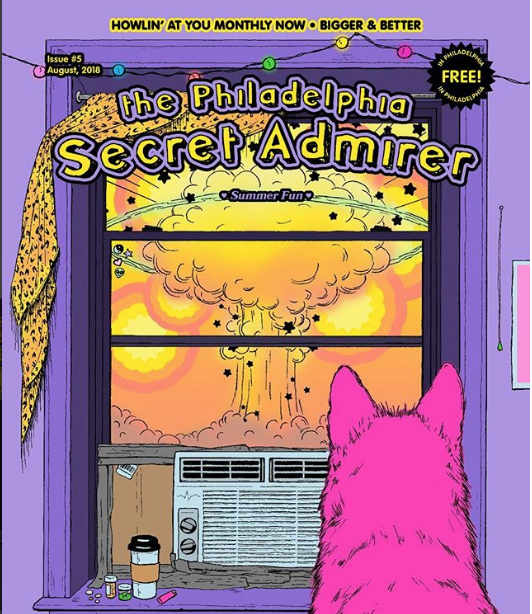BY MARIAH HALL A zine is a self-published, limited circulation and often hand-distributed work, often featuring art, photography, poetry, and prose. Zine culture is rooted in the social and political activism of the ’60s and ’70s, and later became associated with the underground music scene. In a reflection of D.I.Y. values, zines are more focused on expressing particular views rather than gaining profits, and they act as a mode of communication and a platform for those not typically granted a voice.
The last decade has witnessed a resurgence of zine culture, a revival of print media in a paperless age. Although some zines can be found online, published through sources such as Tumblr, WordPress and Issuu, many zines exist physically as hand-bound paper booklets. This is perhaps because zines are an artifact of another era, a time before the all-consuming torrent of social media. It stokes the joy of creating something tangible, something you can hold and collect. It is impossible to accurately track the circulation of zines and this ephemeral nature is a major component of its allure. It is an experience to hunt and find these fleeting and intimately personal works.
So much of our lives exist in the abstract void of the Internet. We regularly take the role of observers, hooked on the inexhaustibly refreshed feed and endless scroll. We are constantly being bombarded with information, an incessant digital yelling. Buried within our phones in every spare moment, it seems people have lost the ability to communicate verbally or connect with strangers. We don’t get to know our neighbors, we ignore each other, adopting a facade of apathy. Zine culture is a way of connecting with the local community through the sharing of art and ideas.
The Philadelphia Secret Admirer is an independent monthly print magazine based in Philadelphia. Issues feature short stories, crossword puzzles, 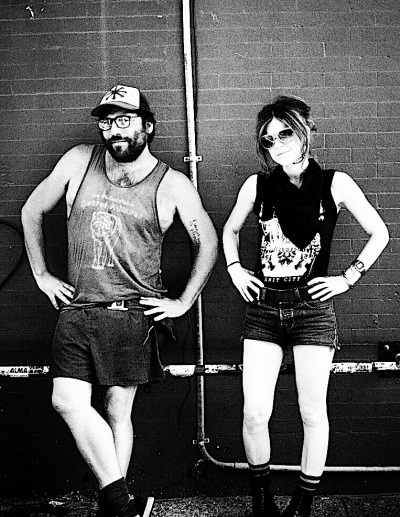 interviews, horoscopes, comic strips and a section called “Overheard,” in which readers submit snippets of out-of-context conversations. It initially began as a free weekly, but after creator David Commins had some luck with Bitcoin investment, he was able to improve the production into monthly booklets. In a recent interview with Phawker, David Commins and art director Rachel Pfeffer [pictured, right] discussed the inspiration of the Admirer, the recent resurrection of zines, the influence of technology on printed word and the spirituality of paper.
interviews, horoscopes, comic strips and a section called “Overheard,” in which readers submit snippets of out-of-context conversations. It initially began as a free weekly, but after creator David Commins had some luck with Bitcoin investment, he was able to improve the production into monthly booklets. In a recent interview with Phawker, David Commins and art director Rachel Pfeffer [pictured, right] discussed the inspiration of the Admirer, the recent resurrection of zines, the influence of technology on printed word and the spirituality of paper.
PHAWKER: What was the inspiration for The Secret Admirer? How did you get started?
DAVID COMMINS: The inspiration from the monthly came out of, about a year ago I was on a road trip and went through Rachel when she was living out in Colorado. My friend Morgan and I stayed with her and her partner. We got to talking and she’s from the area, she was already familiar with the weekly. I needed to do something different. I’d been doing the weekly for almost eight years at that point and my two paths were either make the weekly into a bigger monthly or start Johnny Appleseed-ing weeklies in cool cities around the country. Keep this one going, get a staff, go to Brooklyn and get one going there then go down to North Carolina or Georgia, kind of start seeding and then be able to live in a shack out in the woods and create the general content like the crosswords, but have them do the overheards and stuff. It was either live a lot more in your city or live a lot less in your city. It wasn’t something I felt I could do alone. It was coming across Rachel and stoking that enthusiasm that gave me the belief it could be done.
PHAWKER: So Philly is the only place it’s published currently?
DAVID COMMINS: Right now yes.
PHAWKER: It didn’t start somewhere else?
DAVID COMMINS: It started in Bloomington, Indiana as a monthly zine. It came into what it was going to look like as a weekly in Flagstaff, Arizona. Then it became the weekly in Athens, Georgia.
PHAWKER: Was it mostly something you started for yourself or did you feel that there was something lacking in underground zine culture?
DAVID COMMINS: To be completely honest, I had just had a really bad breakup and I was a debilitating alcoholic, I couldn’t hold down any kind of job. I was like, well I know how to make crossword puzzles and write so I’m just going to go make this piece of shit thing and print out eight dollars’ worth of copies and try to pay rent. There was an immediate warm reception to it that I made a bunch of money right away. It came out of a place of necessity, it was either make this weekly or be homeless again.
RACHEL PFEFFER: I don’t think there’s another magazine like it. This is more speaking to when I got involved in the project, we started dancing with it a year ago and started producing the first issue right before the beginning of 2018. At this point in Philadelphia I think there’s a need for it.
PHAWKER: Where are both of you from?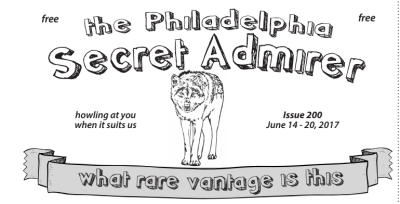
RACHEL PFEFFER: I’m from the Philly area. I lived here until like 2015, then lived in Colorado for two years, then moved back last fall.
DAVID COMMINS: I’m from New Hampshire.
PHAWKER: What brought you here, eventually?
DAVID COMMINS: I was a bit of a traveler and my younger brother came here after he graduated from college. We’d fallen out of contact and he was living here and I was a bit rootless at the time. I was like, oh I’ll go hang out with him and reconnect. He’s since moved away but I liked it here.
PHAWKER: Did either of you go to college?
RACHEL PFEFFER: Yeah. I studied painting.
DAVID COMMINS: I went to school for microbiology with an emphasis on pre-med. Then I took hallucinogens and decided I’d rather be a writer. So I dropped out of one college and went to another for creative nonfiction. I had one of those real tough Hemingway journalism professors who on the first day was like, “None of you are going to be writers.” I was living in a tent in the woods while going to school, because I couldn’t afford both. One morning— I always got there first because I was living outside so sun comes up, I’m up—he sits down and was like, “You do have a chance at being a writer, but you’re not going to find out how to do it in college, so you should leave. If you want to go to another town and make a fake resume just tell me what it says first and I’ll verify it for you.” So I went to Georgia and started working for an alt-weekly, doing music reviews.
PHAWKER: What are other jobs you’ve had before doing this?
DAVID COMMINS: I’ve had all sorts of jobs, kayaking outfitters, shoe stores, Walmarts, driving school buses, trying to find that niche.
RACHEL PFEFFER: I’ve also had a lot of jobs. I did study painting in school. Before I even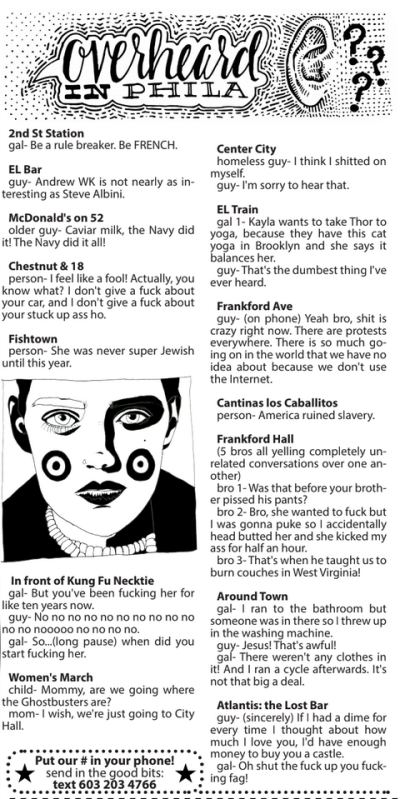 graduated I was doing graphic design, illustration and screen printing. I’ve had some full time design jobs, some freelance stuff. I also have my own business making junk, called Rainbow Feather. The graphic design stuff for me was less of a creative thing and more of a job to pay bills.
graduated I was doing graphic design, illustration and screen printing. I’ve had some full time design jobs, some freelance stuff. I also have my own business making junk, called Rainbow Feather. The graphic design stuff for me was less of a creative thing and more of a job to pay bills.
PHAWKER: Do you have other art projects you’re working on outside of the Admirer?
RACHEL PFEFFER: Yeah I have my company, we make shirts, enamel pins, patches. I do commissioned illustrations and I have a screen printing business called the Rainbow Ranch.
PHAWKER: I feel that lately there has been a revival in zine culture, can either of you speak to evidence of that?
DAVID COMMINS: Yeah, I think this is the moment. The moment for making the magazine was chosen, it didn’t just happen to coincide. I feel that we’ve crossed a hill with trusting the internet. I think there’s a general zeitgeist about interacting with each other. I knew it was coming, I think it came earlier this year where people were just like, fuck this. There was the net neutrality rollback and just blow after blow to the credibility to the internet, with Facebook and advertising and ulterior motives. People trust paper more than screen. Especially if there’s a long established name, there’s something more accessible about that then something you find online.
RACHEL PFEFFER: There always has been a contingent of people who prefer to have a printed thing. That has always been a niche thing. Also the Internet is all algorithms but the content we put out is me and David curating it.
DAVID COMMINS: People like having a piece of paper to do a crossword, to play a game of tic-tac-toe, to make a to-do list. Paper is still very much a part of our spiritual being. I think we collectively miss it and it’s an easy gap to slide into.
PHAWKER: Do you think this revival of circulating print and independent publishing is in part due to political circumstance?
DAVID COMMINS: I do, that’s a component of it. I think the isolation of existing in a digital way in public, or in your house, living on your street and not knowing your neighbors is a fairly new thing. Sitting in a bar and no one’s talking to each other. There’s a general gag reflex to that direction.
PHAWKER: Does zine culture exist in a physical space? How can you access this world’
DAVID COMMINS: I’m an avid journal keeper and The Secret Admirer is very much a journal art piece in its origins. All it takes is writing something relatable and distributing it. Everyone has 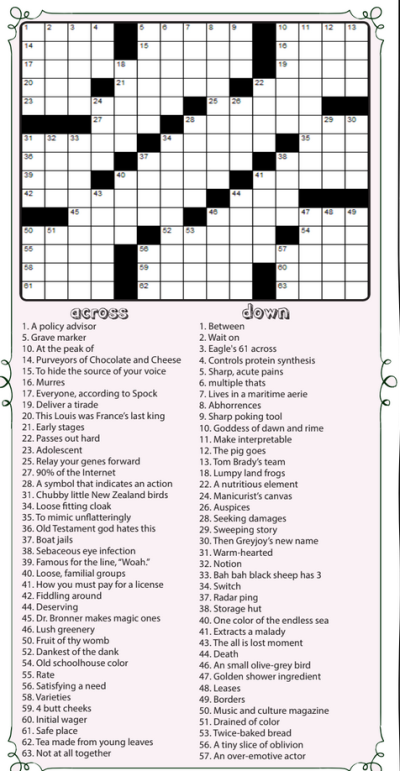 something they can say that’s relatable and I’m really psyched about the zine uptick. There are some people in this town that are doing great things, like Dre Grigorpol who does the zine conference every year. I used to work over at the Wooden Shoe and curate that library.
something they can say that’s relatable and I’m really psyched about the zine uptick. There are some people in this town that are doing great things, like Dre Grigorpol who does the zine conference every year. I used to work over at the Wooden Shoe and curate that library.
PHAWKER: I know there’s Philly Zine Fest and you can find zines at different coffee shops, but I feel there isn’t one place where it all comes together. So how do people find out about other zines?
RACHEL PFEFFER: Before I did the Admirer, I would vend art festivals, I would make some art zines. Denver Zine fest, is amazing, they have a whole library, Denver Independent Comic Con is another awesome event. There are similar events in every city. Some cities have nationally recognized events for small presses and self-publishers. A friend of mine just started Trident Press, publishing people who used to make writing-based zines as actual books. Years ago I had a subscription service where people would just send you a bunch of zines in the mail. The way we distribute the Admirer is more a periodical in some ways, we consider it a zine on steroids. Two of our comix contributors are starting a magazine called Good Boy where they curate a selection of comics, because they felt it’s hard to get into comics because people don’t know where to start. It seems that the zine universe is inextricably bound from comics.
DAVID COMMINS: I think they overlap heavily, but there’s something about zines that’s independent from comics. In regard to how do you find zines, there’s something inherently ephemeral about zines. You find it and it’s like good for you, it’s difficult. I deliver the Admirer to the same places all the time. So if people really want to they can get all of them. There are hundreds of issues of the weekly, I don’t think anyone has read all of them. I used to do a lot of band touring and every time you go to a new town, there’s a shelf in the living room just jammed with xerox copied zines, I’ve read wonderful stuff I’ll never find again. That’s one of the inherent differences to the internet. Part of the reason people have this spiritual aversion, it solidifies you. The opinions you say on social media, the things you affiliate with publicly, come to define you externally. Something you write in a zine is not immediately accessible its one of strengths of the genre is you can’t go to one place, you have to hunt it out.
RACHEL PFEFFER: In most towns with a college there is some coffee shop where someone is real into zines, like Mutiny Information Café in Denver. But the library is never complete, if you ever deep dive something on the Internet and read everything there is to know, you can’t do that with printed zines, there’s always more.
DAVID COMMINS: People have tried. I come from zine culture, I don’t even have all the zines I’ve made.
PHAWKER: Is that part of the reason you stopped putting them online, because the physical copy became more important and accessible?
DAVID COMMINS: I just felt it would be a diminished experience to read it online. It’s not out of anyone’s reach to keep it only print.
RACHEL PFEFFER: There was a point in time where magazines became kind of expensive to subscribe to, especially if you were really young but they would do a cheaper digital subscription, like Issuu, and it was so unsatisfying. It’s not the same, you can’t tear things out, hold it.
PHAWKER: Do you feel it would be more popular if it was also online or do you have a steady fan base that keeps it alive?
DAVID COMMINS: The people who find it, love it, because it’s something local. There’s nothing we’re doing that’s better than something online, you can find a better crossword or horoscope, more interesting stories. I don’t try to compete on that access. If I advertised online as a print-only thing, more people would physically subscribe. Some short stories do well online, like blogs or if you want to be a Twitter personality, you could be successful, but it’s not very appealing to me.
PHAWKER: What’s the creation process like? Who else is involved?
RACHEL PFEFFER: It’s mostly just me and David. We have a comix editor, Josh O’Neill who used to own a comic book store in West Philly. Now he makes one of the comics in the mag, he has a small press called Beehive Books. And then all of our contributors. Half the month is doing our own content and wrangling contributors and trying to sell ads. Then we’re in the studio together trying to aggregate the magazine.
DAVID COMMINS: Our typical day in the office, I get up really early so I’m in by 7 or 8 and Rachel shows up around 10 or 11 and we overlap for a while, then I leave first. That morning energy works well for me to be alone.
RACHEL PFEFFER: The afternoon is my power time. We’re constantly trading ideas.
DAVID COMMINS: This would be too much work if it wasn’t enjoyable.
PHAWKER: How do you create ideas for content? I know it changes from month to month.
RACHEL PFEFFER: We’re moving towards loosely themed issues, but not super strict, just a general suggestion.
DAVID COMMINS: Like the next one is summer fun, the one after that is nostalgia, then the lies we tell ourselves, then how do I hate my family more compassionately.
RACHEL PFEFFER: It’s not like all of the content has been on brand. Some of it is directed by what contributors are sending us. I get a weird feel of each issues based on how we feel making it, and it seems to come through somehow. We have a lot of solid contributors.
DAVID COMMINS: We have too much content all the time and we constantly have to disappoint people.
RACHEL PFEFFER: We get a lot of submissions but if I know someone that’s doing something cool, I’ll ask them to work with us and it’s rare someone’s not into it.
PHAWKER: Does that apply to the artist profiles? Is it usually people you know?
RACHEL PFEFFER: We don’t always know them, a lot of times its supporters of the Admirer or whose work I really love and think they have something interesting to say, I’ll reach out to them.
PHAWKER: How much of it is submission-based versus your own writing? You used to write under pseudonyms, right?
DAVID COMMINS: Not at the moment. If it’s me its David Commines or Emily Centipede. Anything other than that isn’t me. It used to be 100% mine, but it wouldn’t be interesting to read one person’s madness for forty pages.
RACHEL PFEFFER: Can you imagine if you had to take on 12 different personalities?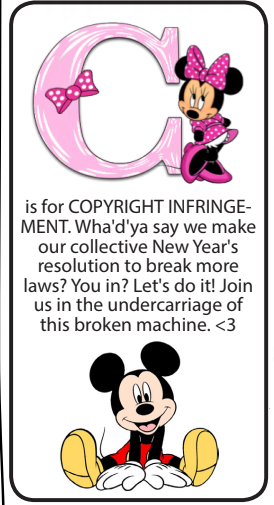
DAVID COMMINS: Yes, I can. That was originally why I did the pseudonym thing. I’m working on novels and stuff in the background. I wanted to learn how to do different voices, try and write from different perspectives and have it be believable.
PHAWKER: Is that where the name comes from?
DAVID COMMINS: Well it was originally called The Admirer and it was going to be a music review thing, all positive reviews, like even if you don’t like the album you can find something nice to say about it. I was going to intentionally get people from one genre, like have a death metal kid to write a review of a twee band. So much of the mythology is invented at this point, it’s been so many things, I try to keep it amorphic.
PHAWKER: Who is your target audience? Who are the kinds of people that are reading this?
DAVID COMMINS: Existentialists. People who feel a general sense of lack.
RACHEL PFEFFER: The bored and lonely.
DAVID COMMINS: I want it to feel like getting a letter from a friend, to distill that element. The kind of people who need a letter in their life.
PHAWKER: Have you met your fans? Do people stop you like, hey aren’t you the guy?
DAVID COMMINS: Well I deliver it myself so mostly on the route, but also I’m fully branded. [Gestures to his purple tank top, which has the Admirer logo on it.]
PHAWKER: Is there a story behind the logo?
DAVID COMMINS: I was looking for a mascot and I was walking through Hobby Lobby and I saw all these stamps and I saw the wolf and then I stole it. And then there’s Coffee News, this international free weekly, one little column of text between squares of ads. I simultaneously loved and hated it. I saw it in different towns around 2007, but it’s in decline. I loved finding them but I was like, I could do this better. Their mascot is this stupid little dude wearing a bowtie and a checkered suit. When I saw the stamp of the wolf I had this vision of the man cowering and this giant wolf leaping out. They tried to sue me with this international lawyer, they sent me a letter address to Mr. Leon Wolffe.
RACHEL PFEFFER: Leon is the wolf’s name.
PHAWKER: Is there a reason he’s called Leon?
DAVID COMMINS: In 2008 I lived in a house with 17 other people. My friend Greg had a cat named Leon and my friend Nick who helped me learn InDesign to make the first few issues lived there with me. Leon the cat always hung out with us and Nick was like, “I think Leon thinks he’s wolf,” because the way he’d walk around. Nick would draw pictures of what a cat who thinks it’s a wolf would look like.
PHAWKER: Do you feel the Admirer has been influential in Philadelphia?
DAVID COMMINS: Yes, it tends to resonate with people that are sad in some way, it’s like this warbling shadow of a friend.
RACHEL PFEFFER: People are like, it’s Sunday I sat down with a nice breakfast at my coffee shop with the Admirer and I’m having a meal with myself. It seems like a sort of companion.
DAVID COMMINS: I feel like I share in hundreds of tiny of nice moments. Its given my life meaning, I’d be dead without it. I’ve struggled pretty heavily with suicide, there have been moments where it gets me out of bed because other people rely on it.
RACHEL PFEFFER: It’s like leaving a breadcrumb trail.
DAVID COMMINS: It’s some psychosomatic trick I play on myself to keep living. But it works, even if it’s a placebo.
RACHEL PFEFFER: There’s something that comes along with doing a periodical that affects  your own life. Every month has a comforting routine, like I have to make sure I’m okay this week because I have to make this magazine people care about.
your own life. Every month has a comforting routine, like I have to make sure I’m okay this week because I have to make this magazine people care about.
DAVID COMMINS: It staunches the self-hatred a little bit. People send postcards and gifts to our P.O. box. That’s something I personally need, to be appreciated by strangers.
PHAWKER: Do you have future goals or a direction you’re moving in?
DAVID COMMINS: The most concrete goal is to get more ads in there. I have enough money saved up to keep it going for a minute, but not two minutes. I’d love to get some distros in other cities, to send to place like the Wooden Shoe, like Red Emma’s, info shops. Every once in a while I shave off a bit of profits and buy a bunch of Plan B or abortion pills and give those out to people that need it. I want to be able to affect more energy in the world with it, become a bigger platform. I want people to see what’s going on with this or that action or democratic socialist meeting, or let’s interview a local political candidate. I want to reach people that seem to be disaffected and depressed. Our demographic is strongly twenty-somethings. Which is a powerful group of people that haven’t had a platform traditionally but is now gaining one. I’d like to give resources and to serve the people that enjoy it. It would be more sustainable on an existential level if it were doing something.
PHAWKER: In terms of it being a platform, is there a specific message or issue you’d focus on?
DAVID COMMINS: It would have to conform to what’s going on at any given moment. It’s value is in getting attention to a specific thing. There are standing issues that can be addressed but I’d keep it topical. Openly talking about mental illness or your own inadequacy can be empowering to hear.
PHAWKER: Are there any artists that inspire you?
DAVID COMMINS: Ursula Le Guin, Hunter Thompson, Joan Didion, Tom Robbins. Those are people that ride the line between social commentary and journalism.
RACHEL PFEFFER: Lisa Frank, Tatsuyuki Tanaka, the animator of Akira, and Rick Griffin, who was a poster artist.
PHAWKER: What advice would you have for someone producing their own zine?
RACHEL PFEFFER: We talked to some students in a Drexel program about that. If someone is determined enough you can do anything, but there were some things that would’ve been prohibitable expensive and time consuming without printing experience.
DAVID COMMINS: My main mantra is there’s no final product. It’s not a novel, you put it out there and then it fades away. Putting something out regularly and knowing it’s not your final product. It doesn’t have to look great, you can start with nothing, find your voice. Sometimes it’s hard to release something imperfect. It’s a very specific kind of art. The periodical lens means it never needs to be finished.
RACHEL PFEFFER: It adds an element of time, that is different from a novel or your magnum opus piece of art. It’s timely. The flip side of that, we don’t hold shit back, we put the best shit we have in every issue. We don’t save anything and it keeps us motivated to come up with the best content for every issue. Neither of us could do it alone, there’s something to be said for collaboration and knowing when to involve other people.
DAVID COMMINS: I knew I couldn’t do a monthly by myself. I needed to bring someone into the cockpit.
RACHEL PFEFFER: I don’t collaborate readily. But this, I don’t think I could do with anyone but David.
DAVID COMMINS: It’s a new kind of relationship, it’s not a friendship or romantic thing, but a creative thing, like a band.
THE SECRET ADMIRER IS AVAILABLE MONTHLY @ A COOL PLACE NEAR YOU

